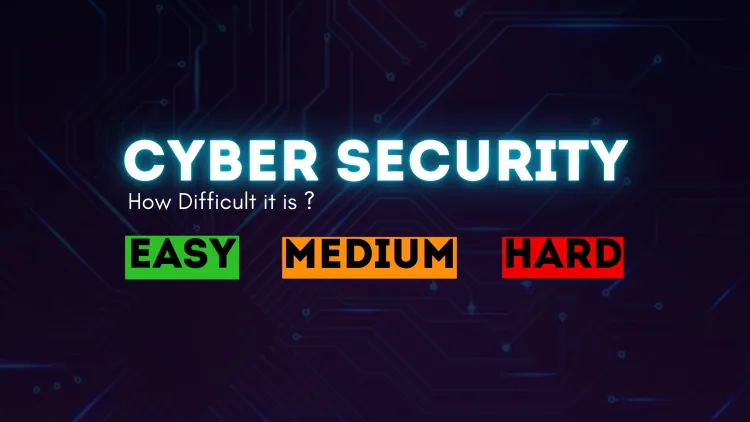Is Cybersecurity Training Easy? Exploring the Realities and Myths
Cybersecurity courses are essential for protecting systems, networks, and data from cyber threats. Whether a course is easy or difficult depends on factors like your technical background, learning approach, and the complexity of topics covered. While cybersecurity requires understanding technical concepts, staying updated with rapidly evolving threats, and honing problem-solving skills, the availability of beginner-friendly courses and practical exercises makes it accessible. Starting with foundational courses like CompTIA Security+ and engaging in hands-on practice with tools such as Kali Linux and Wireshark can simplify the learning process. By staying consistent and leveraging community resources, learners can overcome challenges and build rewarding careers in this high-demand field.

With the rising demand for cybersecurity professionals, many people are considering cybersecurity courses. However, a common question arises: Is a cybersecurity course easy or difficult? The answer depends on various factors, including your background, learning style, and the specific course you choose. Let’s explore what makes cybersecurity challenging and how you can overcome these challenges to succeed in the field.
What is Cybersecurity?
Cybersecurity is the practice of protecting systems, networks, and data from cyber threats such as hacking, malware, and data breaches. It involves a mix of technical skills, analytical thinking, and problem-solving to safeguard digital assets. Cybersecurity encompasses various domains, including:
- Network Security
- Application Security
- Data Protection
- Incident Response
- Ethical Hacking
Each domain requires specialized knowledge and skills, making the field both diverse and dynamic.
What Makes Cybersecurity Difficult?
1. Technical Knowledge Requirement
Cybersecurity involves understanding complex topics like:
- Encryption
- Firewalls
- Intrusion Detection Systems
- Programming Languages (e.g., Python, Java)
2. Rapidly Evolving Threats
The cybersecurity landscape is constantly changing. New types of attacks, such as ransomware and zero-day exploits, require professionals to stay updated.
3. Analytical and Problem-Solving Skills
Analyzing logs, identifying vulnerabilities, and mitigating threats can be mentally demanding.
4. High Attention to Detail
Small errors in configuration or coding can lead to major vulnerabilities, so attention to detail is crucial.
What Makes Cybersecurity Easy?
1. Availability of Resources
Today, there are numerous learning platforms, free tutorials, and community support, making it easier to get started.
2. Beginner-Friendly Courses
Some courses, such as CompTIA Security+ and Certified Ethical Hacker (CEH), are designed for beginners.
3. Hands-On Learning
Practical exercises, such as setting up firewalls or simulating attacks, make learning engaging and straightforward.
4. Growing Career Opportunities
Motivation to secure a high-paying job can make the learning process more manageable.
How to Make Cybersecurity Courses Easier
1. Start with the Basics
Begin with fundamental topics such as:
- Networking
- Operating Systems (Linux and Windows)
- Basic Cryptography
2. Choose the Right Course
Select courses based on your current skill level. For beginners, consider:
- CompTIA Security+
- Introduction to Cybersecurity by Cisco
- Cybersecurity Fundamentals by Coursera
3. Practice Hands-On
Use tools like:
- Kali Linux
- Wireshark
- Nmap Practical experience is crucial in mastering cybersecurity concepts.
4. Join a Community
Participate in forums, online groups, and webinars to gain insights and solve doubts.
5. Stay Consistent
Dedicate regular time to study, practice, and stay updated with the latest cybersecurity trends.
Easy vs. Difficult Aspects of Cybersecurity
| Aspect | Easy | Difficult |
|---|---|---|
| Technical Knowledge | Beginner courses simplify concepts | Advanced topics like malware analysis |
| Learning Resources | Abundance of online materials | Filtering high-quality resources |
| Practical Exercises | Fun and interactive | Time-consuming and complex simulations |
| Keeping Up with Trends | Blogs, podcasts make it accessible | Rapid pace of new threats |
| Job Opportunities | High demand motivates learning | Competitive and challenging environment |
Who Can Succeed in Cybersecurity?
Cybersecurity is not limited to technical experts. If you have any of the following skills, you can excel in this field:
- Curiosity: A natural interest in how systems work.
- Analytical Thinking: Ability to analyze data and identify patterns.
- Problem-Solving Skills: Tackling challenges with creative solutions.
- Continuous Learning: Staying updated with the latest trends and technologies.
Conclusion
Whether a cybersecurity course is easy or difficult depends on your approach and dedication. While the field presents challenges, it also offers numerous resources and beginner-friendly pathways. With consistent effort, practical experience, and the right guidance, you can navigate through the complexities and build a successful career in cybersecurity. So, take the first step, and unlock the exciting opportunities that this field has to offer!
FAQs
-
Is cybersecurity hard for beginners?
Not necessarily. Beginners can start with basic courses like CompTIA Security+ and gradually move to advanced topics. -
Do I need coding skills for cybersecurity?
Coding is not mandatory for entry-level roles but becomes essential for advanced positions like penetration testing. -
How long does it take to learn cybersecurity?
Depending on the course and your dedication, it can take 6 months to 2 years to gain a strong foundation. -
Can non-technical people learn cybersecurity?
Yes, with the right resources and consistent practice, anyone can learn cybersecurity. -
What is the easiest way to start in cybersecurity?
Begin with foundational courses and hands-on labs to understand basic concepts. -
Which certifications are best for beginners?
CompTIA Security+, Cisco’s Introduction to Cybersecurity, and Certified Ethical Hacker (CEH). -
How important is staying updated in cybersecurity?
Very important, as threats evolve rapidly, requiring continuous learning. -
Are cybersecurity jobs stressful?
Some roles can be demanding, but effective time management and skills can help. -
What tools are used in cybersecurity courses?
Tools like Kali Linux, Wireshark, Nmap, and Metasploit are commonly used. -
Is cybersecurity a good career in 2025?
Absolutely! The demand for skilled professionals continues to grow, offering lucrative opportunities.











![Top 10 Ethical Hackers in the World [2025]](https://www.webasha.com/blog/uploads/images/202408/image_100x75_66c2f983c207b.webp)



![[2025] Top 100+ VAPT Interview Questions and Answers](https://www.webasha.com/blog/uploads/images/image_100x75_6512b1e4b64f7.jpg)







